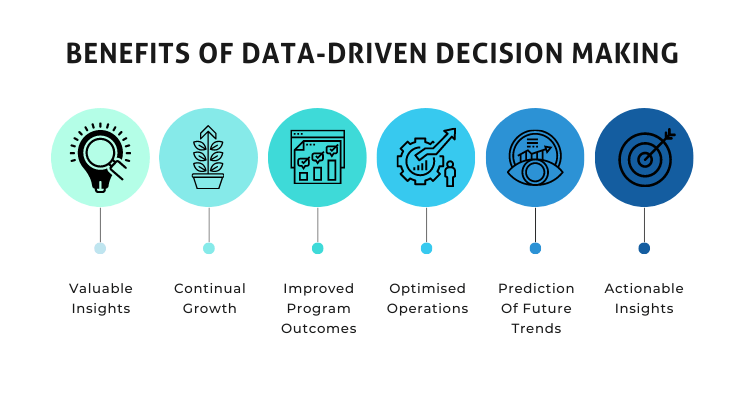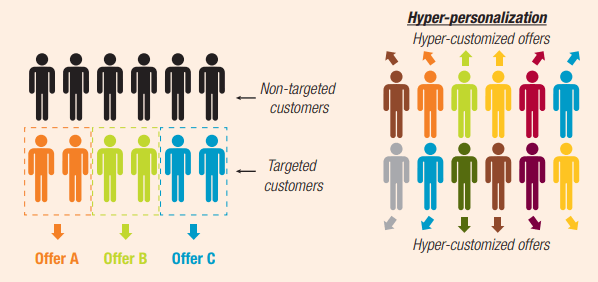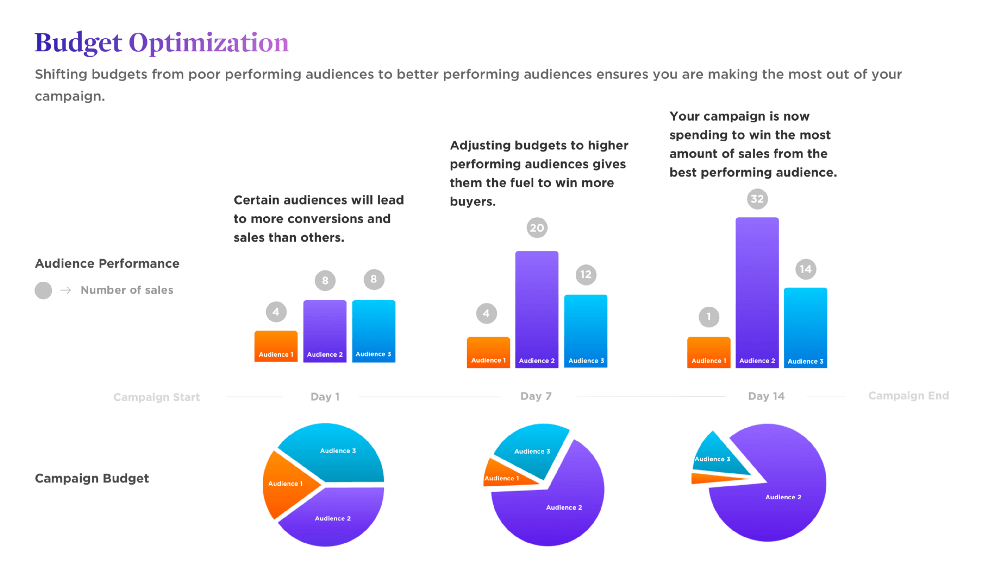Sales in the Modern Era: The Role of Data in Crafting Effective Marketing Plans

Data has become the lifeblood of business operations, it's no surprise that it plays an important role in modern sales and marketing.
Picture this: the data generated in the last two years alone exceeds all the data created throughout human history up to that point. This explosion of information is transforming the way businesses engage with their customers, and understanding its significance is essential for staying ahead in the game. It's the key to understanding the secrets of consumer behavior, refining your marketing strategies, and, ultimately, driving sales growth.
But first, let's set the stage. In this blog post, we'll dive deep into the profound impact of data in modern sales and marketing and explore how it's intricately woven into the fabric of crafting effective marketing plans.
What is Data?
Data refers to raw facts, statistics, or information that can be collected, recorded, stored, and analyzed. It can take various forms, including numbers, text, images, audio, video, and more. Data can be generated from a wide range of sources, such as sensors, surveys, social media interactions, online transactions, and countless other sources. In 2023 alone, around 2.5 quintillion bytes worth of data are generated each day, translating to 44 zettabytes worth of data in the entire digital platform.

Data is fundamental to making informed decisions and gaining insights in various fields, including business, science, technology, healthcare, and more. In the context of modern sales and marketing, data can encompass information about customers, their behavior, preferences, demographics, purchase history, and much more. This data is invaluable for crafting targeted marketing strategies, personalizing customer experiences, and optimizing business operations.
Data can be classified into Three different types:
- Structured Data: This type of data is highly organized and easy to analyze. It's typically stored in databases and can be in the form of tables with rows and columns. Examples include customer names, addresses, purchase dates, and product prices.
- Unstructured Data: Unstructured data lacks a predefined structure and can be more challenging to analyze. Examples include text data from social media posts, images, audio recordings, and video content.
- Semi-structured Data: Semi-structured data falls in between structured and unstructured data. It has some level of organization, often using tags or labels, but it may not follow a rigid structure. Examples include XML and JSON data.
In the context of sales and marketing, data is crucial for understanding customer behavior, identifying target audiences, measuring campaign effectiveness, and ultimately driving business growth.
Importance Of Data In The Changing Landscape Of Sales And Marketing
Data plays a pivotal role in formulating your business strategies, enabling your company to attain superior outcomes and foster effortless growth by guiding the marketing choices for your brand. Consequently, the practice of data-driven marketing assumes paramount significance as it furnishes invaluable insights into the efficacy of your digital marketing initiatives.

Source: LinkedIn
Here's how a data-driven approach can facilitate the expansion of your marketing strategy:
1. Fuel Your Pipelines with Accurate Leads

At the heart of data-driven marketing lies the profound ability to comprehend customer behavior. Through a meticulous analysis of pertinent data, businesses can unearth invaluable insights into customer preferences, purchasing behaviors, and interaction metrics. This heightened comprehension empowers marketers to fine-tune their messaging, optimize marketing initiatives, and deliver tailor-made experiences that deeply resonate with their target audience. Whether it involves tailoring personalized product recommendations or curating precisely targeted content, data-driven marketing provides companies with the means to forge robust customer connections, igniting engagement and elevating conversion rates.
2. Assign Significance to Personas

An integral facet of data-driven marketing involves the refinement of customer segmentation. This provides the framework for engaging with the correct personas through well-suited content.
With data encompassing demographics, behavior, and interests, businesses can pinpoint distinct customer segments. This advanced level of segmentation equips marketers with the tools to precisely target specific audience groups using customized messages and offerings, resulting in more favorable marketing outcomes. Instead of relying on a universal approach, data-driven marketing empowers businesses to fashion personalized marketing strategies that cater to the distinct needs and preferences of various customer segments, ultimately leading to elevated conversion rates and heightened customer satisfaction.
3. Building The Right Product for The Right Market

The real-time availability of hyperlocal data on product inventory and sales is a catalyst for producing demand-driven products. Predictive analytics and forecasting emerge as invaluable assets within the data-driven marketing toolkit. By tapping into historical data, businesses can unveil recurring patterns and emerging trends that serve as a window into future customer behavior.
Armed with this knowledge, marketers can proactively tailor their strategies, keeping pace with competitors and capitalizing on emerging opportunities. Be it predicting shifts in consumer preferences or anticipating market dynamics, data-driven marketing equips businesses to make calculated decisions and optimize resource allocation, ultimately fortifying their market position and fostering sustainable growth.
4. Hyper Personalization

Source: Instapage
Crafting personalized landing pages and elevating the customer experience represents two fundamental pillars of effective marketing strategies, and data-driven marketing assumes a central role in realizing both objectives. Businesses can deliver precisely targeted content, personalized product suggestions, and tailored messaging across various touchpoints by harnessing customer data.
This heightened level of personalization contributes to increased customer contentment and fosters brand loyalty. Customers who perceive a brand's understanding and appreciation are more inclined to engage with it, make recurring purchases, and evolve into brand advocates.
According to McKinsey, over 70% of consumers now anticipate personalization, and they may become frustrated when it falls short.
Employing data to steer personalization endeavors, businesses can establish deeper connections with their customer base, generating memorable encounters that fuel loyalty and enduring prosperity.
5. Marketing Effectiveness

Source: lucidadvertising
Adopting a data-driven marketing approach fosters an in-depth comprehension of customer behaviors and preferences, empowering marketers to craft finely-tailored and pertinent messaging that deeply connects with their audience. By customizing marketing campaigns for specific customer segments, businesses can enhance engagement, boost conversion rates, and ultimately elevate the overall efficacy of their marketing efforts.
6. Enhanced Team Productivity

Data streamlines processes by offering valuable insights, allowing teams to prioritize high-impact activities and reduce inefficiencies. With data-driven segmentation, marketing efforts become highly targeted, resources are allocated wisely, and automation tools boost efficiency while providing real-time feedback. Collaboration and continuous learning are encouraged through transparent data sharing, and customized training plans can be tailored to keep the team at the forefront of the ever-evolving marketing landscape.
7. Budget Optimization and Conversion Insights
Effective budget optimization and conversion insights are at the core of maximizing marketing ROI. By strategically allocating resources based on data-driven performance analysis, you can enhance the efficiency of your budget, reduce acquisition costs, refine campaigns through A/B testing, and improve the customer journey with conversion funnel analysis.

Source: Toneden
Predictive analytics aids in proactive budget allocation, while tracking and attribution models help identify the most influential touchpoints. The reallocation of unused budget ensures every dollar is employed effectively, resulting in higher conversion rates and a superior return on investment.
8. Achieving Precise and Effective Information Dissemination
In the digital age, precise and effective information dissemination is a linchpin of successful marketing. Tailoring content to segmented audiences, personalizing messages, and leveraging diverse communication channels are essential. Ensuring clarity and timeliness while analyzing feedback and data-driven insights is vital for continually optimizing communication. Consistency in branding and adaptability to changing dynamics and legal compliance round out the key elements, fostering stronger audience connections and driving engagement to meet marketing objectives.
Recent Marketing Articles
- Why Job Title Targeting is Your Secret Weapon for Sales Success
- Connecting with Care: Reaching Busy Healthcare Professionals with a Winning Mailing List Strategy
- Transform Your Contractor Marketing with These Simple Yet Effective Tips
- Score More Clients: Best 10 Tried-and-True Lead Generation Tips for Lawyers
- Top 10 Female Entrepreneurs Changing the Face of Healthcare
- Top 10 Female Entrepreneurs Changing the Face of Healthcare
- An Inside Look at Meta Threads: Statistics and Insights for 2023
- Comprehensive Guide to Types of Sales Channels and Selling Your Product Successfully
- The Importance of a Targeted Biotechnology Industry Email List
- 10 Must-Know Tips for Marketing Your Law Firm In 2023
- How Buying B2B Data Helps To Close More Deals?
- 10 Tools That Actually Close More Deals
Data Challenges and Opportunities in the New Era of Sales and Marketing
Despite the numerous benefits of data-driven marketing, businesses encounter various challenges when embracing this methodology.
Below are the primary hurdles faced in the implementation of data-driven marketing strategies:
1. Data Privacy and Security

Data privacy and security are paramount in the age of data-driven marketing. In the initial quarter of 2023, data breaches globally resulted in the exposure of over six million data records, jeopardizing the security and privacy of individuals and organizations alike.
As a result, with the increasing reliance on customer data for personalized campaigns, businesses must safeguard sensitive information. Stringent data protection measures, compliance with regulations like GDPR and CCPA, and the responsible handling of customer data are essential. A data breach can not only tarnish a company's reputation but also lead to severe legal and financial repercussions. In this environment, maintaining the trust and confidence of customers is a top priority, necessitating robust data privacy and security practices.
2. Data Quality And Availability

Data quality and availability are fundamental in data-driven marketing. To make informed decisions and create effective strategies, businesses rely on accurate, up-to-date, and accessible data. Poor data quality can lead to erroneous insights and misguided marketing efforts, undermining the entire process.
Consider this: Up to half of employees' work hours are squandered on routine data quality tasks, while nearly 40% of leads are marred by inaccuracies. A significant 41% of businesses identify incongruent data across their technologies as their primary obstacle. Astonishingly, merely 16% of companies rate the quality of the data they utilize as "excellent."
Hence, It's essential to maintain rigorous data management practices, verify the accuracy of data sources, and ensure data accessibility for relevant teams. Robust data quality and availability pave the way for sound decision-making, successful campaigns, and the realization of the full potential of data-driven marketing initiatives.
3. Information Overload
Information overload poses a significant challenge in data-driven marketing. The sheer volume of data available can be overwhelming, making it difficult to discern what's truly relevant. Businesses must sift through vast datasets to extract valuable insights, striking a balance between collecting data and effectively using it. Efficient data management and analysis tools are crucial to avoid drowning in the deluge of information. Focusing on quality rather than quantity and employing advanced analytics allows companies to turn data into actionable insights and maintain a competitive edge in the data-driven marketing landscape.
4. Rapid Technological Changes

The rapid pace of technological change is a constant challenge in data-driven marketing. New tools, platforms, and trends emerge frequently, making it imperative for businesses to adapt swiftly. Staying up-to-date with the latest technologies and trends is essential for maintaining a competitive edge. Successful data-driven marketers are agile and open to innovation, embracing new solutions while evaluating their potential impact. Adapting to these changes ensures that marketing strategies remain effective and relevant in a fast-evolving digital landscape, ultimately fostering growth and success.
5. Competition

As more businesses harness the power of data to refine their strategies, the landscape becomes increasingly crowded. This heightened competition necessitates a constant drive for innovation and differentiation. Staying ahead requires a deep understanding of customer data, an ability to analyze it effectively, and a knack for crafting personalized experiences. By differentiating through tailored messaging, creativity, and superior customer engagement, businesses can gain a competitive edge in a data-saturated market, ultimately driving growth and success.
6. Enhanced Team Productivity

Customer empowerment is a defining aspect of modern data-driven marketing. The internet has armed customers with easy access to information, options, and reviews. In this empowered position, customers demand seamless and personalized experiences. Meeting these expectations necessitates a comprehensive understanding of customer behavior, preferences, and feedback. Businesses must adapt to this shift in power by offering tailored solutions, transparent communication, and exceptional customer service. Empowering customers to make informed choices not only builds trust but also cultivates loyalty, making them advocates for the brand in the long run.
7. Cybersecurity Threats

Cybersecurity threats loom as a persistent concern in data-driven marketing. Each day witnesses a staggering 2,200 cyber attacks, occurring at a frequency of approximately every 39 seconds on average. Within the United States, the average cost of a data breach stands at $9.44 million, and it is anticipated that cybercrime will incur a staggering expense of $8 trillion by the year 2023.
With the increasing reliance on digital platforms and the collection of customer data, businesses have become vulnerable to cyberattacks and data breaches. Protecting customer information and maintaining trust is paramount. A breach not only damages a company's reputation but can also lead to severe legal and financial consequences. Robust cybersecurity measures, employee training, and proactive monitoring are crucial to fend off threats. Ensuring data security remains a top priority to safeguard customer trust and maintain a competitive edge in the data-driven marketing landscape.
Job Title Specific Email List
8. Budget and resources
Budget and resource allocation is a critical factor in data-driven marketing. While data-driven strategies can be highly effective, they often require financial investments in analytics tools, technology, and skilled personnel. Ensuring that adequate budget and resources are allocated is essential for success. Striking the right balance between cost and impact is crucial, as is being adaptable and responsive to changing needs. Maximizing ROI while effectively utilizing available resources is a delicate yet vital task that shapes the outcomes of data-driven marketing endeavors.
What is the solution to data challenges in 2023?

In response to these intricate data challenges, there is a set of solutions that can act as a roadmap for businesses navigating the data-driven marketing landscape. These solutions encompass an array of strategies and technologies aimed at addressing evolving concerns, fostering innovation, and ensuring data integrity and compliance.
To name a few:
- Data Governance: Establish comprehensive data governance frameworks to ensure data quality, privacy, and security. Compliance with regulations like GDPR and CCPA is critical.
- Advanced Analytics: Leverage advanced analytics, including artificial intelligence and machine learning, to extract meaningful insights from data, enabling more informed decision-making.
- Data Integration: Implement data integration solutions to harmonize data from various sources, ensuring a unified and accurate view for analysis.
- Cloud Computing: Utilize cloud platforms to store, process, and analyze data, offering scalability and flexibility while reducing infrastructure costs.
- Transparency: Maintain transparent communication about data collection, usage, and storage practices to build trust with customers.
- Trusted Data Sources: Trusted data sources are the bedrock of informed decision-making. They provide accurate, credible, and legally compliant information, ensuring data integrity and consistency. Relying on such sources reduces risks, instills stakeholder confidence, and simplifies the decision-making process in today's competitive landscape.
Can a Purchased Database Be the Ultimate Solution?

Purchasing a database can indeed offer valuable insights and be a solution for specific marketing needs. It provides access to a broad spectrum of potential leads and helps businesses expand their reach. However, it's crucial to use purchased data ethically, respecting data privacy and regulatory guidelines.
Additionally, reputable database providers adhere to best practices related to data quality, privacy, and security, as highlighted here. This commitment ensures that data concerns, such as accuracy and compliance with regulations, are addressed, bolstering confidence in the data's reliability and ethical use. It underlines the importance of choosing data providers that prioritize these critical aspects to align with your data-driven marketing objectives effectively.
The effectiveness of a purchased database largely depends on the quality and relevance of the data. So make sure to choose the right one!
Wrap-Up
Without a doubt, data plays a pivotal role in shaping successful marketing campaigns for businesses. It offers valuable insights into visitors, aiding in their conversion into potential customers. Furthermore, data-driven marketing initiatives foster stronger customer relationships, equipping businesses to remain competitive in a dynamic market environment.
If you're in search of a dependable data provider, we've got you covered. AverickMedia prioritizes compliance with industry regulations, delivering high-quality data to businesses like yours. We aim to alleviate your workload while enabling your progress. Reach out to us today for data-driven insights that can fuel your upcoming campaign's success.







